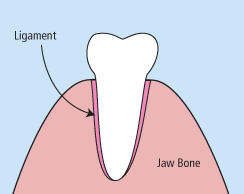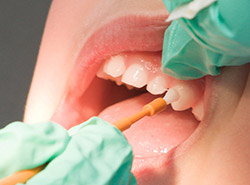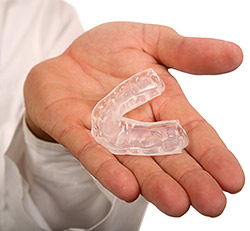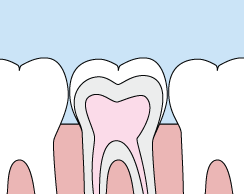Topics on this page

Regular Exams and Cleanings
Regular exams are an important part of maintaining your child's oral health. During your child’s regular exam, we will:
- Check for any problems that may not be seen or felt
- Look for cavities or any other signs of tooth decay
- Inspect the teeth and gums for gingivitis and signs of periodontal disease
- Perform a thorough teeth cleaning
Your child’s exam will take about 30 minutes. Each regular exam includes a detailed teeth cleaning, in which we will clean, polish, and rinse the teeth to remove any tartar and plaque that have built up on the tooth’s surface.
Visiting our office every six months gives you the chance to talk to the doctor about any questions you may have about your child’s oral health. Regular exams are offered by appointment only, so please contact our practice today to schedule your child’s next dental exam and teeth cleaning.
Extractions
 There are times when it is necessary to remove a tooth. Sometimes a baby tooth has misshapen or long roots that prevent it from falling out as it should, and the tooth must be removed to make way for the permanent tooth to erupt. At other times, a tooth may have so much decay that it puts the surrounding teeth at risk of decay, so the doctor may recommend its removal. Infection, orthodontic correction, or problems with a wisdom tooth can also require removal of a tooth.
There are times when it is necessary to remove a tooth. Sometimes a baby tooth has misshapen or long roots that prevent it from falling out as it should, and the tooth must be removed to make way for the permanent tooth to erupt. At other times, a tooth may have so much decay that it puts the surrounding teeth at risk of decay, so the doctor may recommend its removal. Infection, orthodontic correction, or problems with a wisdom tooth can also require removal of a tooth.
When it is determined that a tooth needs to be removed, your child’s dentist may extract the tooth during a regular checkup or may request another visit for this procedure. The root of each tooth is encased within the jawbone in a “tooth socket”, and the tooth is held in that socket by a ligament. In order to extract a tooth, the dentist must expand the socket and separate the tooth from the ligament holding it in place. While this procedure is typically very quick, it is important to share with the doctor any concerns or preferences for sedation.
Fillings
We are a mercury free office. This means we do not place silver fillings, we only place composite (white) fillings in our patients' teeth. A comparison of traditional amalgams with composites reveals the following advantages of the new materials. Composites (1) are esthetically pleasing; (2) they do not contain mercury; (3) they actually adhere to the tooth surface; (4) they require less removal of sound tooth structure; and (5) are less irritating for the tooth nerves. Your insurance company may only cover up to 50% of these fillings to be placed. Please be advised that any balance remaining after insurance is the patient's responsibility. We will send in a pre-determination of dental benefits to your dental insurance as a courtesy to you.
Fluoride
 Fluoride is effective in preventing cavities and tooth decay and in preventing plaque from building up and hardening on the tooth’s surface. A fluoride treatment in a dentist’s office takes just a few minutes. After the treatment, your child may be asked not to rinse, eat, or drink for at least 30 minutes in order to allow the teeth to absorb the fluoride. Depending on your child’s oral health or the doctor’s recommendation, a fluoride treatment may be required every three, six, or twelve months.
Fluoride is effective in preventing cavities and tooth decay and in preventing plaque from building up and hardening on the tooth’s surface. A fluoride treatment in a dentist’s office takes just a few minutes. After the treatment, your child may be asked not to rinse, eat, or drink for at least 30 minutes in order to allow the teeth to absorb the fluoride. Depending on your child’s oral health or the doctor’s recommendation, a fluoride treatment may be required every three, six, or twelve months.
Mouthguards
 Whether your child wears braces or not, protecting his or her smile while playing sports is essential. Mouthguards help protect the teeth and gums from injury. If your child participates in any kind of full-contact sport, the American Dental Association recommends that he or she wear a mouthguard. Choosing the right mouthguard is essential. There are three basic types of mouthguards: the pre-made mouthguard, the “boil-and-bite” fitted mouthguard, and a custom-made mouthguard from the dentist.
Whether your child wears braces or not, protecting his or her smile while playing sports is essential. Mouthguards help protect the teeth and gums from injury. If your child participates in any kind of full-contact sport, the American Dental Association recommends that he or she wear a mouthguard. Choosing the right mouthguard is essential. There are three basic types of mouthguards: the pre-made mouthguard, the “boil-and-bite” fitted mouthguard, and a custom-made mouthguard from the dentist.
Our office has a mouthguard program for current patients. We offer 2 complimentary custom mouthguards per patient, per year. To have a custom mouthguard made, please call our office to schedule a 10-15 min appointment for an impression. For patients that are in active orthodontic treatment in need of a mouthguard, we recommend the "boil-and-bite" mouthguard until they have completed treatment.
Nightguards
 If your child often wakes up with jaw pain, earaches, or headaches, or if you see your child clenching or grinding his or her teeth, your child may have a common condition called “bruxism”. Many people do not even know that they grind their teeth, as it often occurs when one is sleeping. If not corrected, bruxism can lead to broken teeth, cracked teeth, or even tooth loss.
If your child often wakes up with jaw pain, earaches, or headaches, or if you see your child clenching or grinding his or her teeth, your child may have a common condition called “bruxism”. Many people do not even know that they grind their teeth, as it often occurs when one is sleeping. If not corrected, bruxism can lead to broken teeth, cracked teeth, or even tooth loss.
There is an easy, non-invasive treatment for bruxism: nightguards. Nightguards are an easy way to prevent the wear and damage that teeth-grinding causes over time. Custom-made by a dentist from soft material to fit the teeth, a nightguard is inserted over your child’s top or bottom arch and prevents contact with the opposing teeth.
Sealants
 Sometimes brushing is not enough, especially when it comes to those hard-to-reach spots in your child’s mouth. It is difficult for a toothbrush to get in between the small cracks and grooves on your child’s teeth. If left alone, those tiny areas can develop tooth decay. Sealants give your child’s teeth extra protection against decay and help prevent cavities.
Sometimes brushing is not enough, especially when it comes to those hard-to-reach spots in your child’s mouth. It is difficult for a toothbrush to get in between the small cracks and grooves on your child’s teeth. If left alone, those tiny areas can develop tooth decay. Sealants give your child’s teeth extra protection against decay and help prevent cavities.
Dental sealants are a plastic resin that bonds and hardens in the deep grooves on your child’s tooth’s surface. When a tooth is sealed, the tiny grooves become smooth and are less likely to harbor plaque. With sealants, brushing your child's teeth becomes easier and more effective against tooth decay.
Sealants are typically applied to children’s teeth as a preventive measure against tooth decay after the permanent teeth have erupted. It is more common to seal “permanent” teeth rather than “baby” teeth, but every patient has unique needs, and your child’s dentist will recommend sealants on a case-by-case basis.
Sealants last from three to five years, but it is fairly common to see adults with sealants still intact from their childhood. A dental sealant only provides protection when it is fully intact, so if your child’s sealants come off, let your dentist know, and schedule an appointment for your child's teeth to be re-sealed.



 Website Powered by Sesame 24-7™
Website Powered by Sesame 24-7™